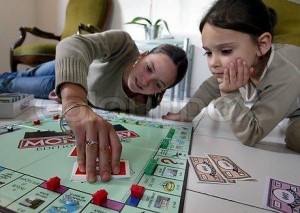 When looking for the best educational games for children, the first thought is often the Internet.
When looking for the best educational games for children, the first thought is often the Internet.
It is true that there are games online for every age, but it is the more traditional games that offer the best education.
Children should have the opportunity to use the computer as soon as they have the dexterity to use a mouse. The sooner they start using a computer, the more familiar they will be with what has become an important tool in our society.
There are games and learning activities found on the Internet that can engage a pre-school child and teach them lessons with numbers and letters. Older children can learn with more advanced games such as those involving mathematics.
Board games
However, the real benefit of educational games can still be found in the offline world, especially with board games.
They offer the advantage of being more hands on than a computer game and are usually played with another person. With the introduction of a board game, a child can not only learn, but interact with a parent or caregiver. They learn various concepts and do so in an enjoyable way. At the same time, there is a bonding that takes place with the person playing the board game with a child.
Chutes and Ladders
Perhaps the single best board game to introduces a pre-school child to is Chutes and Ladders.
There is no need for a child to read anything. The board is well illustrated with chutes and ladders. Your child will learn to count and move a playing piece square to square. A child will also learn the valuable lesson of taking turns. At this age it is important not to be stringent with the actual rules of the game. You want a game such as this to nourish a child’s creativity.
Game of Sorry
After kindergarten, the game of Sorry can be introduced.
There are no dice or spinners to advance your playing piece, only a set of cards. When children play this game they make progress towards winning, then find themselves being set back a number of spaces by their opponent. This will usually cause a moderate amount of frustration in a child, and they will have the opportunity learn sportsmanship.
Learning how to be a good sport when something does not go your way is an important lesson. There is also an opportunity to teach children to be a good winner and not gloat when they send their opponent back to the starting point.
Monopoly
When children reach around ten years of age, it is the right time to introduce the game of Monopoly.
This game has been around for several generations and is thought to be a good family game, but Monopoly has many lessons to teach kids, especially those in the last couple of years of elementary school.
Learning the use of money as well as common financial terms that will likely be a part of their lives as adults. This game has been updated over the years, and several versions are available. It can be a long game, but time limits can be agreed upon before the start of play.
